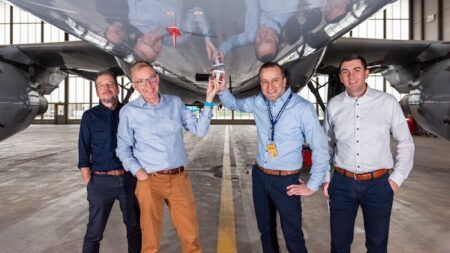Hamburg and Montréal, two of the world’s largest aviation regions, have launched a cooperative R&D program. Over the next three years, the partners will conduct joint research on quieter aircraft cabins and fireproof composite fiber components, with plans also underway for a further joint research project, which is yet to be confirmed.
In total 20 partners are involved in the transatlantic cooperation, including companies of varying sizes, universities, and research institutions in both countries. The project aims to combine the competencies of both continents in the development of innovative new products. The program is part of the New High-Tech strategy of Germany’s Federal Ministry of Education and Research (BMBF) and is receiving government and commercial funding from both Germany and Canada.
Quieter aircraft cabins
Today’s aircraft engines are getting quieter and quieter, but noise and vibration continue to be transferred to the inside of the aircraft via the outer skin of the fuselage, particularly at take-off. The performance limits of conventional insulating materials such as glass wool and foam have long since been reached. As a next step, the German and Canadian researchers want to investigate the potential of new sound-absorbing insulation called acoustic metamaterials.
The research will be tested at sites including the Acoustics Lab at Hamburg’s ZAL Center of Applied Aeronautical Research, which is among the most extensive such facilities in Europe.
New fireproof composites
Modern aircraft are quiet and light, largely due to the increased deployment of lightweight composite fiber materials. In the second research project, current production methods of composite materials for the aircraft cabin are to be further optimized. The partners want to test new material combinations for their suitability in production and for flammability, with the goal of making composite materials used in aircraft even safer, environmentally friendlier, and lighter.




